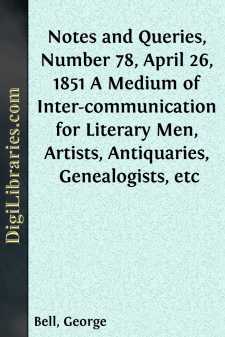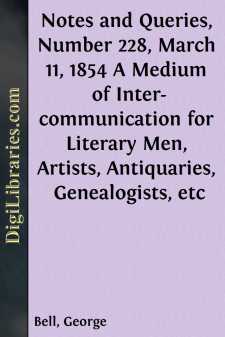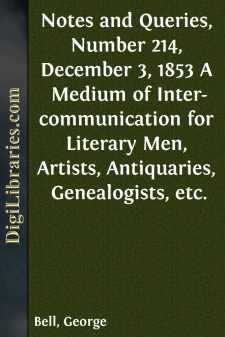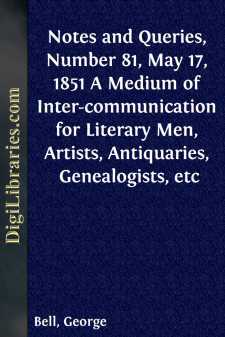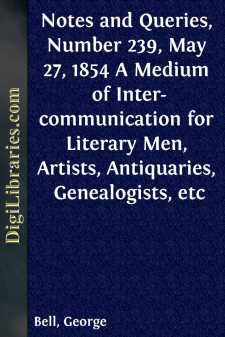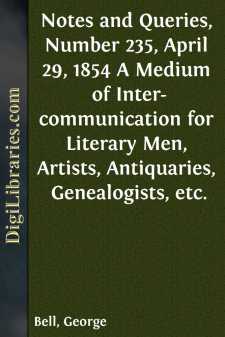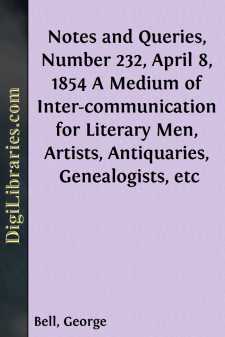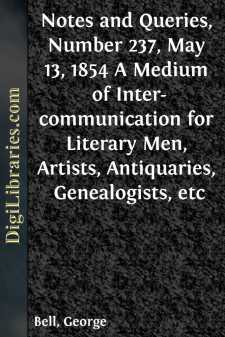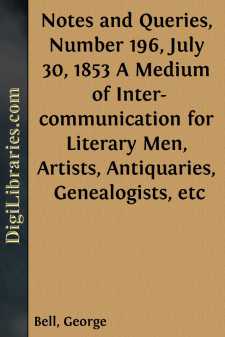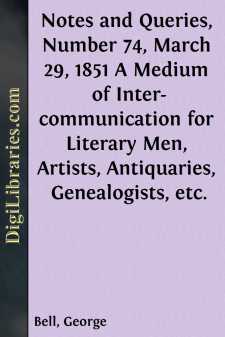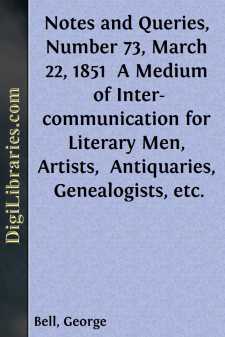Categories
- Antiques & Collectibles 13
- Architecture 36
- Art 48
- Bibles 22
- Biography & Autobiography 813
- Body, Mind & Spirit 142
- Business & Economics 28
- Children's Books 14
- Children's Fiction 11
- Computers 4
- Cooking 94
- Crafts & Hobbies 4
- Drama 346
- Education 46
- Family & Relationships 57
- Fiction 11829
- Games 19
- Gardening 17
- Health & Fitness 34
- History 1377
- House & Home 1
- Humor 147
- Juvenile Fiction 1873
- Juvenile Nonfiction 202
- Language Arts & Disciplines 88
- Law 16
- Literary Collections 686
- Literary Criticism 179
- Mathematics 13
- Medical 41
- Music 40
- Nature 179
- Non-Classifiable 1768
- Performing Arts 7
- Periodicals 1453
- Philosophy 64
- Photography 2
- Poetry 896
- Political Science 203
- Psychology 42
- Reference 154
- Religion 513
- Science 126
- Self-Help 84
- Social Science 81
- Sports & Recreation 34
- Study Aids 3
- Technology & Engineering 59
- Transportation 23
- Travel 463
- True Crime 29
Notes and Queries, Number 78, April 26, 1851 A Medium of Inter-communication for Literary Men, Artists, Antiquaries, Genealogists, etc
by: George Bell
Categories:
Description:
Excerpt
ON THE PROPOSED SUGGESTIONS FOR PRESERVING A RECORD OF EXISTING MONUMENTS.
The following communications have reached us since the publication of our remarks on the proposed Monumentarium Anglicanum (No. 73. p. 217. et seq.). They serve to show how much interest the subject has excited among those best qualified to judge of the great utility of some well-organised plan for the preservation of a record of our still existing monuments.
Mr. Dunkin's letter (which was accompanied by a copy of the prospectus issued by him in 1844) claims precedence, as showing the steps which that gentleman has already taken. It is a communication highly creditable to his exertions in the cause, but does not alter our views as to the practicability of any successful attempt to accomplish this object by individual exertion.
In No. 73. Vol. iii. of "Notes and Queries" you have honoured me by an allusion to the Monumenta Anglicana I have in the press, as "a plan which would have your hearty concurrence and recommendation, if it were at all practicable; but which must fail from its very vastness." It may be so; but the motto of my family is Essayez. Every "gigantic scheme" must have a commencement, and this "scheme," I am perfectly aware, is one "that no individual, however varied in attainments and abilities, could without assistance hope to achieve." My father, upwards of half a century since, commenced collecting mortuary memorials; many of the monuments from which he copied the inscriptions have since been destroyed by time, and many, very many, more by the ruthless innovations of beautifying churchwardens. These "very vast" collections—the labour of a life—however, only form a portion of the materials I now posses; for since I issued my prospectus in 1844, I have received many thousands of inscriptions and rubbings of brasses from clergymen and others; and I trust I shall be favoured with still further assistance, as in all cases where information is rendered, the source whence derived shall be most thankfully and freely acknowledged.
The plan I have adopted with regard to arrangement is to folio each page three times, viz., i. each parish by itself; ii. each county; iii. alphabetically; so that each parish can be considered complete in itself; each county can be bound up by itself; or the whole alphabetically, gazetteer-wise.
The index will be also in three divisions,—i. general; ii. names of places; iii. names of persons.
With regard to the number of volumes,—I need not say that that is entirely in nubibus. My impression is limited to seventy-five copies, the same as my father's Oxfordshire, with which it corresponds in size.
I should have preferred seeing the government performing the task of preserving manuscripts of all existing monuments; but it is the fashion in Britain for government to leave all apparently national undertakings to individual exertion. I will here conclude with a quotation from the report I have just published of the Transactions at the Congress of the British Archæological Association held in Worcester:
"Lamentation is, however, worse than useless: the spirit of the age forbids all idle mourning....


